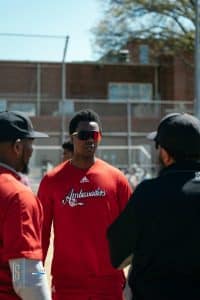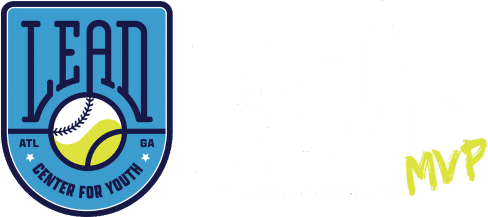 I’m going to start this blog with four fastballs, so dig in. Did you know that Atlanta is the No. 1 city for income inequality in America? In fact, if a person is born into poverty in Atlanta, there is just a 4% chance of escaping poverty in their lifetime.
I’m going to start this blog with four fastballs, so dig in. Did you know that Atlanta is the No. 1 city for income inequality in America? In fact, if a person is born into poverty in Atlanta, there is just a 4% chance of escaping poverty in their lifetime.
Did you know that the late Bill Bartholomay was responsible along with Atlanta Mayor Ivan Allen, Jr., for Major League Baseball relocating from Milwaukee to Atlanta in 1966 to help prove that Atlanta was a “City Too Busy To Hate”?
L.E.A.D. Center For Youth was established by my wife, Kelli, and I, in 2007 to empower an at-risk generation to lead and transform their city of Atlanta by using the sport of baseball to teach Black boys how to overcome three curveballs that threaten their success: crime, poverty and racism.
Our Breaking Barriers ATL program was created to create a brave space for the advancement of Atlanta’s youth in baseball and life.
This past weekend, I attended several baseball games at Buckhead Baseball along with L.E.A.D. Program Coordinator Intern Parris Austin. Following are some questions that he stepped up to the plate to answer while we were in between games.
Using 10 words or less, who are you?
A man no longer living in his comfort zone.
Where would you like to be in 10 years as a coach?
While it is always fulfilling to help baseball players improve and harness their skills, I would love to take on the responsibility of being a minority scouting director. In this role, I will provide MLB organizations with the best information possible to help improve diverse representation.
How is working with L.E.A.D. preparing you to go there?
Within the game, this job helps me gain experience and affords me an opportunity to form relationships with a number of directors and coaches associated with high school, collegiate and professional baseball from across the nation.
L.E.A.D. is a direct connection to a large pool of minority baseball talent. The curriculum boosts my interpersonal skills and assists me in better-identifying player needs while also building my credibility within the industry.
What are all of the levels of baseball that you have competed at?
Little League, USSSA Major, both state and national travel, high school, independent and affiliated professional baseball in the New York Mets organization
Using 10 words or less, how do you define a coach?
A teacher who develops strong leaders in sports and life.
What are the top three signs of a good coach?
Someone who is knowledgeable, honest about performance, and communicates well, win or lose.
When was the first time that you played on a baseball team when you were the minority based on race?
Little League at Perry Parham Baseball Association in 1992-93.
I believe that every boy in America of all races and ethnicities should play baseball for at least one season. What are the top three things that baseball can teach all boys?
I too believe every boy in America of all races and ethnicities should play baseball for at least one season. When practiced and applied, baseball teaches foundational leadership skills and mental toughness. Meanwhile, it also equips them with the ability to adapt to a new environment.
Atlanta is No. 1 for income inequality in America based on race with there being a disparity between the “Bluff,” which is majority African-Americans and low-income and Buckhead, which is majority White and wealthy. On Saturdays in the spring, you are serving as a coach with L.E.A.D. in the “Bluff.” What are the top three things that are the same about baseball in Buckhead compared to the “Bluff”? What are the top three things that are different?
When I think about baseball in Buckhead compared to the “Bluff,” I think about the five games I observed in one week, three in the “Bluff” and two in Buckhead, both of which concluded with the presence of support in the stands on game day.
Second, field maintenance and upkeep are a priority for both programs. Following intense rainfall, ball fields are generally soft and muddy however, the grounds crew at both parks evaluated and carefully repaired them ahead of schedule allowing games to be played as planned.
Third, the most up-to-date rules and regulations are implemented fairly to carry out each game. The on-field operations in Buckhead and the “Bluff” are managed effectively.
Imagine having to drown out the noise and visual distraction of a high-speed chase taking place in the middle of a game or having a mandatory police presence at each game. The safety of the neighborhoods that surround the ball field is the biggest difference between baseball in Buckhead and baseball in the “Bluff.”
Second, size matters when it comes to baseball fields. Boys in the “Bluff” are playing on a larger high school field versus their peers who play on a field designed for middle school athletes. This makes it challenging, yet not impossible, for players and coaches to analyze parts of the game such as hitting, baserunning and defense.
Lastly, there is a difference in accessibility between the two communities. Access to resources such as uniforms, transportation, and exposure to playing with a diverse group of team members is limited for the athletes in the “Bluff.” Without the support of L.E.A.D., many of these necessities would not be available to the boys.
What needs to be done to increase the number of African-Americans competing at the collegiate and professional levels of baseball?
- Access to mentorship and counseling for the players and their parents.
- Funding to build stronger middle and high school athletic programs and training facilities in underserved communities
- Exposure and adequate funding to participate in competitive travel baseball
- Educational scholarships and grants
- Development of college recruitment programs that specifically target African American athletes
- Build a stronger presence of African American managers and front-office staff at the collegiate and professional level
What skills do you have that will help increase the number of African-Americans competing at the collegiate and professional levels of baseball?
I know these kids and I can relate to their experiences. At times, I can relate to how they think about scenarios. I have walked the same streets and experienced the same emotions, both good and bad. The drugs, the violence, the peer pressure, everything that they go through I know.
Walking in their shoes gives me the insight to serve as a leader and increase the number of African Americans in the game. This is a skill money can’t buy.
I also take pride in providing high-quality instruction, strong decision-making when it comes to baseball strategy and scouting, professional etiquette, and 10 years of professional playing experience.
What skills do you not have that working with L.E.A.D. will teach you that will help you increase the number of African-Americans competing at the collegiate and professional levels of baseball?
This job has already begun to teach me about sustaining long-term relationships with high-level professionals in the industry and the city of Atlanta.
What’s the best hitting drill in your toolbox—one you believe will help all hitters get out of a hitting slump?
Mini wiffle ball drills with a line drive approach is a routine I use to help all hitters that want to get out of a hitting slump. The drill works for any age or skill level and focuses on reestablishing concentration and consistent contact.
For more information, visit L.E.A.D. Center for Youth today. Also, check out our Digital Magazine.



